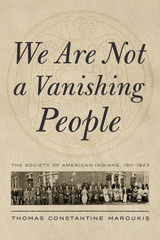
248 pages, 6 x 9
2 b&w photos
Paperback
Release Date:21 Feb 2023
ISBN:9780816548163
Hardcover
Release Date:21 Feb 2023
ISBN:9780816548170
My Heart Is Bound Up with Them
How Carlos Montezuma Became the Voice of a Generation
The University of Arizona Press
Carlos Montezuma is well known as an influential Indigenous figure of the turn of the twentieth century. While some believe he was largely interested only in enabling Indians to assimilate into mainstream white society, Montezuma’s image as a staunch assimilationist changes dramatically when viewed through the lens of his Yavapai relatives at Fort McDowell in Arizona.
Through his diligent research and transcription of the letters archived in the Carlos Montezuma Collection at Arizona State University Libraries, David Martínez offers a critical new perspective on Montezuma’s biography and legacy. During an attempt to force the Fort McDowell Yavapai community off of their traditional homelands north of Phoenix, the Yavapai community members and leaders wrote to Montezuma pleading for help. It was these letters and personal correspondence from his Yavapai cousins George and Charles Dickens, as well as Mike Burns that sparked Montezuma’s desperate but principled desire to liberate his Yavapai family and community—and all Indigenous people—from the clutches of an oppressive Indian Bureau.
Centering historically neglected Indigenous voices as his primary source material, Martínez elevates Montezuma’s correspondence and interactions with his family and their community and shows how it influenced his advocacy. Martínez argues that Montezuma’s work in Arizona directly contributed to his national projects. For his Yavapai community, Montezuma set an example as a resistance fighter and advocate on behalf of his people and other Indigenous groups. Martínez offers a critical exploration of history, memory, the formation of archival collections, and the art of writing biography.
Through his diligent research and transcription of the letters archived in the Carlos Montezuma Collection at Arizona State University Libraries, David Martínez offers a critical new perspective on Montezuma’s biography and legacy. During an attempt to force the Fort McDowell Yavapai community off of their traditional homelands north of Phoenix, the Yavapai community members and leaders wrote to Montezuma pleading for help. It was these letters and personal correspondence from his Yavapai cousins George and Charles Dickens, as well as Mike Burns that sparked Montezuma’s desperate but principled desire to liberate his Yavapai family and community—and all Indigenous people—from the clutches of an oppressive Indian Bureau.
Centering historically neglected Indigenous voices as his primary source material, Martínez elevates Montezuma’s correspondence and interactions with his family and their community and shows how it influenced his advocacy. Martínez argues that Montezuma’s work in Arizona directly contributed to his national projects. For his Yavapai community, Montezuma set an example as a resistance fighter and advocate on behalf of his people and other Indigenous groups. Martínez offers a critical exploration of history, memory, the formation of archival collections, and the art of writing biography.
In this important work, David Martínez offers a fresh perspective on the life and times of Carlos Montezuma, one of the most influential Indigenous people of the late nineteenth and early twentieth centuries. In so doing, he invites his readers into a critical exploration of history, memory, the formation of archival collections, and the art of writing biography.’—Daniel M. Cobb, editor of Say We Are Nations: Documents of Politics and Protest in Indigenous America since 1887
‘In this fascinating portrait of an Indigenous community and an Indigenous activist, David Martínez shows that Carlos Montezuma’s thundering opposition to the BIA came from his personal experience with the BIA’s tyrannous attempts to sever his relatives from their remnant of homeland. The Fort McDowell Yavapais gave voice to Carlos Montezuma every bit as much as he gave voice to them.’—Daniel Herman, author of The Feudist: A Novel of the Pleasant Valley War
In this important work, David Martínez offers a fresh perspective on the life and times of Carlos Montezuma, one of the most influential Indigenous people of the late nineteenth and early twentieth centuries. In so doing, he invites his readers into a critical exploration of history, memory, the formation of archival collections, and the art of writing biography.’—Daniel M. Cobb, editor of Say We Are Nations: Documents of Politics and Protest in Indigenous America since 1887
‘In this fascinating portrait of an Indigenous community and an Indigenous activist, David Martínez shows that Carlos Montezuma’s thundering opposition to the BIA came from his personal experience with the BIA’s tyrannous attempts to sever his relatives from their remnant of homeland. The Fort McDowell Yavapais gave voice to Carlos Montezuma every bit as much as he gave voice to them.’—Daniel Herman, author of The Feudist: A Novel of the Pleasant Valley War
In this important work, David Martínez offers a fresh perspective on the life and times of Carlos Montezuma, one of the most influential Indigenous people of the late nineteenth and early twentieth centuries. In so doing, he invites his readers into a critical exploration of history, memory, the formation of archival collections, and the art of writing biography.’—Daniel M. Cobb, editor of Say We Are Nations: Documents of Politics and Protest in Indigenous America since 1887
‘In this fascinating portrait of an Indigenous community and an Indigenous activist, David Martínez shows that Carlos Montezuma’s thundering opposition to the BIA came from his personal experience with the BIA’s tyrannous attempts to sever his relatives from their remnant of homeland. The Fort McDowell Yavapais gave voice to Carlos Montezuma every bit as much as he gave voice to them.’—Daniel Herman, author of The Feudist: A Novel of the Pleasant Valley War
David Martínez is professor of American Indian studies at Arizona State University and is enrolled in the Gila River Indian Community. He is the author of Life of the Indigenous Mind and Dakota Philosopher: Charles Eastman and American Indian Thought.










